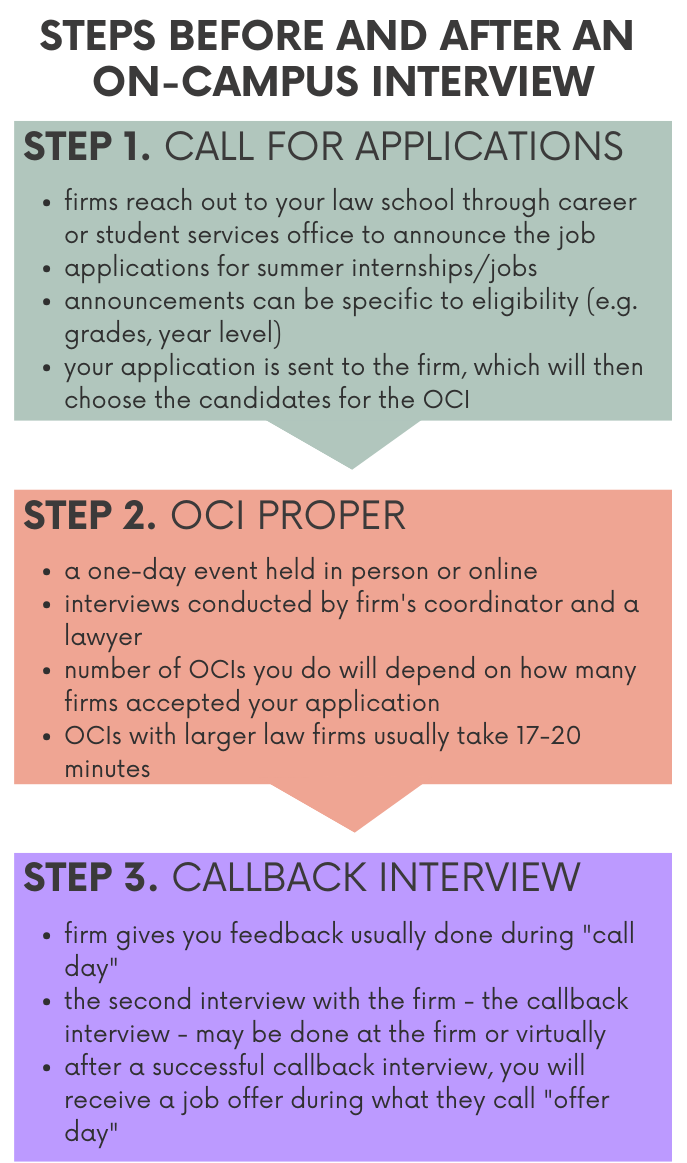
On-campus interviews (OCIs) are an important step for law students. Learn expert tips to excel, secure your future, and boost your confidence. Find out more in this article

Learning law is confined within the four corners of the classroom, as actual experience and practical knowledge are also helpful in your legal career. When looking for summer internships to add to your experience as a law student, on-campus interviews are one of the few steps that you may want to take.
This article is for law students who are preparing for on-campus interviews and want to learn some tips to do well during this career-defining event.
On-campus interviews (or OCIs) are when different law firms visit law schools across the country to conduct interviews with their chosen student-applicants. These interviews are part of a process for law students to get a possible summer internship, which may even lead to employment after graduation.
An OCI is not the first and last step to get that summer job in a firm that you want. There are other steps before and after an OCI:

As an interviewee, it’s your responsibility to know the specific dates in the OCI timeline. Coordinate with your law school’s student or career services office for this.
As more senior law students will attest to, OCIs can give you a lot of opportunities after becoming a lawyer. This is why you should give 100% for a successful OCI. Some benefits of OCIs include:
When preparing for on-campus interviews, you will want to stand out from the rest of the interviewees. At the same time, you would want the firm to know your best version, but also the real you.
To help you through this process of OCIs, here are some tips:
The first thing that you should do, especially before sending your application, is to learn more about the law firms you are interviewing with. If possible, it’s also good to know the names and positions of the interviewers who will conduct the OCI.
This will help not just when preparing your résumés and cover letters, but also during the actual interview.
Here are some points to keep your eye on when preparing your application for OCIs:
Your résumé is what your interviewers will rely on during the on-campus interviews. Have a good grasp of your résumé to be able to answer questions about the information you've put there. Otherwise, there will be doubts about your application’s credibility.
Also, know some talking points in your résumé, such as a specific experience, which you can easily expound on by telling a simple background or story. This will help you look relaxed and organized during the actual on-campus interviews.
To prepare for on-campus interviews, watch this video:
If you’re looking for the top firms of whatever size or practice area, check out our Special Reports on the best law firms in Canada.
Whether you’ve done a couple of interviews in the past or none at all, it’s still important to know how an on-campus interview goes. For this, it’s helpful to know some of the common interview questions to help you prepare. But it’s also advisable not to stick to your prepared answers if it affects the way you answer the interviewer’s questions.
Typically, the interviewer may start an OCI with easy questions, like:
They may also ask about your law school journey so far, with questions such as:
Next, they’ll go over your résumé and ask you about the experience you have listed. Some examples are:
But then again, questions during the on-campus interview can be random to test your wit, attitude, and how you react. These are also opportunities for the interviewer to know your personality. Some of these questions are:
But whatever comes your way, always remember to keep your cool and be humble with your answers. It’s also recommended not to overthink your answers during the OCI. Remember that these interviewers (especially if they’re lawyers) can easily catch if something is not right.
Usually, near the end of every OCI or if the interviewer has no more questions, they’ll now ask if you have questions for them. This is an opportunity to show respect and interest in the firm. It’s a great way to display your personality too.
Here are some tips to help you prepare questions during the on-campus interviews:
|
Don't ask: |
Ask: |
|
meaningless or out-of-topic questions |
next steps if you’re hired |
|
questions whose answers can be easily found on their socials or website |
those that can help you decide on which firm is the best for you |
|
results of specific cases they’re handling, as these are sensitive information |
aspects of the firm you’re curious about (e.g., mentoring program, pro bono program) |
If you’re still unsure what to ask, you are also allowed to say that you have no questions in mind. However, it may be a missed opportunity to learn and to show your interest in the process. In any case, you can always use the standard go-to questions of on-campus interviews.
Your next focus is to face that actual on-campus interview, and here are tips to get you through this process.
You want to look alert and interested in this interview; don’t give your interviewers any reason to think otherwise. Also, when answering questions, you will look more convincing when you’re smiling, look put together, and are making eye contact with the interviewers (if there’s two or more).
The same way your interviewer looks at how you answer their questions, there are also non-verbal cues of your interviewers that show they are interested in what you are saying. You know you’re doing it right during an OCI when, for example, they’re nodding their heads, looking you in the eye, or asking you follow-up questions.
And don’t think about lying your way through the on-campus interview (including saying things not in your résumé or exaggerating some written information). Again, in most cases, you’re going to be interviewed by lawyers themselves, and they’re good at knowing if you’re lying!
If there are parts of the on-campus interview process that confuse you, don’t hesitate to contact your student or career services offices (or any similar office). It’s one of the main functions of these offices, and they’ll be happy to assist you. For example, if you need help with your résumé or cover letter, these offices may have sample formats that you can follow.
Also, it’s important to coordinate with these offices regularly, especially on the relevant dates of pre- and post-OCIs. Usually, call dates and offer dates are already set, and you should know when these are.
When preparing your law school clothes for on-campus interviews, you want to stand out for the best reasons. As your go-to, business casual attire would be the best option during an OCI. You can also dress a bit more formally.
Here are some tips to consider when choosing what wear in an OCI:
After overcoming the tough part, there are other things that you still need to do after the OCI. This includes sending out thank-you emails to the firms that interviewed you.
When writing and sending thank-you emails, you’d still want to show interest in the firm. You don’t have to write a long email just to show appreciation; a simple two-line email is enough.
Landing an OCI is not an assurance that you’ll get that summer job you want, but you will have one foot in the door, which is all anyone can ask for. It’s important to do your best, along with smart preparations, when doing these interviews.
Overall, it all comes down to being poised, polished, and ready to talk about yourself in a manner that comes off as confident but not arrogant. A lot of it, though, also comes down to luck — having an interviewer who shares the same interests as you can make an average candidate look exceptional.
As firms would tell you, these on-campus interviews can just be light conversations. So, relax, take a deep breath, be yourself, and you’ll do just fine.
For more articles on law schools and resources for law students, check out and bookmark our Legal Education page.